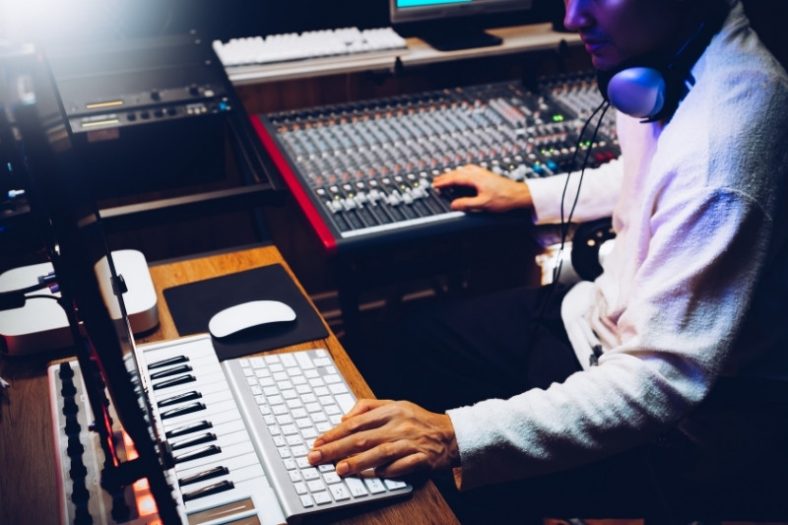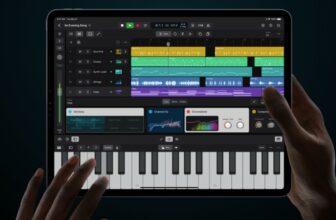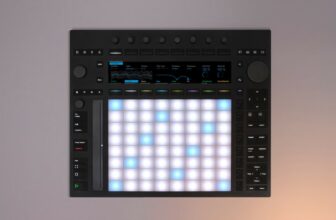Is Music Production Hard?

Music production has never been easier. But that doesn’t mean that becoming a successful music producer doesn’t take time and hard work. While access to music technology and musical knowledge has never been as standardized as today, the music market is more competitive than ever.
More people producing music means it’s tougher for new producers to stand out. On the other hand, truly talented producers don’t depend on anything but themselves to make their dreams come true—perhaps for the first time in history.
Forget about the days of having to save thousands of dollars to buy expensive studio equipment. And forget about the time when producers needed to rely on music executives to have a platform for releasing their work. Today, anyone can have a number-one hit song with nothing but free music software and a SoundCloud account.
Yes, producing music has never been easier. So, why does it feel so difficult for beginners? While there are plenty of misconceptions about music production out there, some aspects of it are genuinely hard.
Contents
What Makes Music Production Hard?
Music production is hard because it demands a varied set of skills. Successful music producers need to be good at composing, mixing, and mastering music. They also need to know how to work with other musicians. Finally, they have to be business-savvy to make it in a highly competitive industry.
These are some reasons why music production is so hard:
- It takes a long time. There’s a learning curve to all crafts, but music production is not something anyone will master after a two-week workshop. If you want to be a music producer, make sure you’re ready to play the long game—being patient and knowing how to deal with failure is a must.
- It can get very technical. People who don’t understand music production tend to view it as an artistic pursuit in which inspiration is all that matters. But music production involves many technical concepts. If you want to produce high-quality tracks, be ready to spend a lot of time learning about the ins and outs of music production.
- It demands social skills. Yes, some successful music producers are loners. But even the loneliest music producer in the world needs—at the very least—to know how to engage with his audience. To produce music, you’ll need social skills at each step of the way, as you’ll be required to interact with other musicians, reach out to promoters to book live gigs and get in touch with your online followers.
- It requires a special something. The music industry is over-competitive. That means that developing a signature music-production style is almost mandatory to stand out from the most. Believe it or not, this is the hardest thing to achieve in music production. Some highly skilled producers spend their lifetimes searching for their special sound, only to miss out in the end.
The Business Side of Music Production
For better or worse, music is a business. To make it as a music producer, you’ll need more than knowing how to come up with high-quality tracks. You’ll also need to know how to navigate the music industry.
Sadly, a lack of business know-how is often what turns very skilled producers into starving artists. To make it in such a tough game, you need to surround yourself with experienced people who believe in your work and make the most of every opportunity at your disposal.
Is There a High Demand for Music Producers?
There’s a high demand for music producers because music producers can work in all fields related to audio. Music production isn’t limited to making beats. It also involves soundtracks, sound design, live stage sound, record engineering, mixing and mastering, and even podcast/radio editing.
How Do Music Producers Make a Living?
Music producers make a living either by authoring/co-authoring commercially-released tracks or by selling their services to clients. Just like musicians, music producers can benefit from copyrights. Additionally, they can get paid by working for musicians, movie studios, radios, venues, etc.
When a music producer releases a track, he or she will often keep a percentage of the track’s copyrights. This means that every time such a track is used commercially, the producer will be entitled to a certain sum of money. In the United States, distributing copyrights fees is up to performance rights organizations such as BMI Music.
What Do You Need to Become a Music Producer?
These are the main things you need to become a music producer:
- Time (Essential): Forget about expensive equipment, solid connections in the industry, and a professional home studio. The best asset of a music producer is and always will be time. Learning music production takes years, and so does coming up with quality tracks. Even the world’s best and most experienced music producers can take months to complete a single beat.
- A DAW (Essential): You cannot produce music out of thin air, and a digital audio workstation (DAW) is a must-have software for any producer. There are tons of quality DAWs out there, from the EDM-friendly Ableton Live and Bitwig Studio to the hip-hop-oriented FL Studio. And the best part is that there are also many amazing free DAWs out there.
- Music knowledge (Essential): Music knowledge is essential to be a music producer, but that doesn’t mean you have to rely on a particular type of music knowledge. You don’t need to go to music school, you don’t need to understand every aspect of music theory, and you don’t even need to know how to play an instrument. What you do need is to have music sensibility. You need to know what constitutes a good and bad song, which sounds are cool and which sounds are cheesy, and what the freshest artists in the world are up to. In other words, you must love music.
- A nice sound system (Recommended): Producing music is a lot about analyzing music with your ears. With that in mind, it’s highly recommended that you have a good sound system. Ideally, you’d have an acoustically-treated room, a set of studio monitors, and high-quality headphones. If you don’t have the budget for all of these, try to make the most of what you already have by listening to chart-topping tracks in your sound system and using them as a benchmark.
- A MIDI controller (Recommended): Some of the best producers in the world snub MIDI controllers completely, but I’d recommend having one if you’re still learning about music production. A MIDI controller will help you to express your musical instincts quicker and have a lot more fun in the process.
- An audio interface (Recommended): If you’re thinking of working with vocals, getting an audio interface is a must-do. Audio interfaces are very useful for recording sounds directly into your DAW, and they can also make wonders for the overall sound quality of your system and your laptop’s processing power.
- An enthusiastic friend (Recommended): This is especially important if you’re still learning about music production. Having an enthusiastic friend to help you in moments of distress (believe me, there will be plenty) is highly recommended. Music production can be frustrating, and giving up is way easier if you’re working alone. Having a buddy by your side will help you to continue to pursue your goals, even in the face of failure.
Finally, let’s clear up some misconceptions about what it takes to become a music producer:
Do You Need to Play an Instrument to Become a Music Producer?
You don’t need to play an instrument to become a music producer. Some music producers choose to sit in front of the DAW precisely because they can’t play. Music production is about patience, creativity, and technical knowledge. It’s the perfect craft for music lovers who happen to have slow fingers.
Do You Need to Go to Music School to Become a Music Producer?
Music-production knowledge is always a must, but studying music in school is non-essential to becoming a music producer. Some of the best music producers in the world have never attended a music lesson. Music production is all about trusting your ears and going with whatever sounds best.
Do You Need to Know Music Theory to Become a Music Producer?
You don’t need to learn music theory to become a music producer. Making chart-topping beats is about finding the ideal timing, feel, and vibe. Music theory is useful for reading sheet music, communicating with musicians, and exploring advanced musical concepts, but that’s about it.
Tips For Becoming a Music Producer
Becoming an established music producer is a years-long process, and there’s no right or wrong way to start. Some music producers start developing their abilities when they’re still children, while others get into music production later in life.
If you’re passionate about music, and you can find the time to work on music production, you can become a music producer. Getting started can be daunting, but these tips can hopefully offer you some sort of guidance:
Put Your Work Out There as Soon as Possible
When you’re a new music producer, comparing your work with the work of the best is simply not fair. It’ll take a long time for you to develop your amateurish sound (no offense) into something that can stand out.
This doesn’t mean you should keep your output to yourself before reaching the level you want to, much on the contrary. My advice to beginner music producers is to put your work out there as soon as possible.
Even if your tracks are still not ready, they will reach out to someone and motivate you to continue working. If you’re passionate about music, this will reflect in your work—even if your output isn’t as technically accomplished as you’d like to.
Luckily, there’s no lack of platforms for releasing music in today’s world. Bandcamp and SoundCloud are two personal favorites, but you can also grow an audience by using regular social media (TikTok is great for music, for instance).
Use YouTube to Learn About Music Production
Music technology made it possible for a talented music producer to come up with a number-one hit song with nothing but willful determination and a cheap laptop. But the Internet also allows wannabe music producers to learn virtually everything there is to know about music production for free.
There’s plenty of information about music production on the Internet, but YouTube remains the best place to learn about the ins and outs of the craft. You can use YouTube to learn how to use a DAW, to understand the different components of mixing and mastering, and to learn all there is to know about music theory.
Take it from me: years into my work as a music producer, I still watch YouTube tutorials regularly, and I’m always searching for that new piece of information that will help to improve my workflow, to come up with new sounds, or to make better business decisions.
Learning about music is crucial for beginner music producers, but it’s something even experienced music producers should never stop doing.
Book a Live Gig
Once you have around 40 minutes of original music ready, you’re qualified to perform a live gig. Playing live in front of an audience is downright the scariest thing new music producers can do. But even the humblest of live gigs will help you immensely to push your music career forward. Here’s why:
- Playing live will give you the confidence to stand by your work. When you face an audience in the eye, you’re no longer hiding behind a monitor. If a tree falls in the forest and no one hears it, does it make a sound? For what it’s worth, it doesn’t. That’s why performing live is the ultimate rite of passage for music creatives.
- Playing live will help you to get connected. Music producers can meet plenty of people online—from music pros to fans. But live gigs are still the best way to find new connections in the music industry. Even if you’re performing at a tiny local bar, there’s a chance you’ll meet an interesting promoter, convince other bar owners to book you, or reach out to one or two passionate fans.
- Playing live will help you to make better decisions. Forget about streaming statistics and online followers. The best metric for evaluating the quality of your music is playing live. Every live gig is a learning experience, and your music will only get better after each performance. Live gigs make for a unique opportunity to test your music in real-time: you get to see how an audience reacts to each song, to each moment of a song, to the way you organized your setlist, and to how you decided to present yourself live.
Find Your Niche
Beginner music producers may feel tempted to explore different genres just so they can prove to themselves that they have the technical know-how to come up with anything in their DAWs. I wouldn’t advise against it, but I would also recommend that you find your niche as soon as possible.
Finding your niche is important for two reasons.
First, you’ll immediately start developing the techniques you need to stand out in the niche you want to explore. The more you work on soundtracks, for instance, the better you’ll become at making soundtracks. The same applies to all genres of music.
Second, you’ll be able to make the most of your audience. If your dream is to become a techno producer, for instance, it makes sense that the first tracks you release are techno tracks. This way, you won’t disappoint your fan base in the long run, and you’ll be able to keep your very first fans.
The Pros and Cons of Becoming a Music Producer
Pros
- You get to be creative and have fun every single day.
- You get to meet lots of interesting, like-minded people.
- You get to choose your working hours, even if you have to meet deadlines.
- A stroke of luck (such as working on a number-one hit) is all it takes to make it.
- You can have a meaningful cultural and emotional influence on the world.
Cons
- You’ll need to work hard to make your voice heard.
- You’ll most likely make zero money in the first few weeks, months, or even years.
- You’ll be stepping into an already overcrowded industry.
- Some very talented music producers still fail to succeed.
- If you don’t keep up with the latest trends, your work will quickly sound outdated.
Summary
Becoming a music producer has never been easier, but music production is far from being an easy job. If you’re looking for a career in which you can make an easy buck, I’d recommend looking somewhere else. But if working with music is your true dream, you should at least give it a go. Life goes by fast, so don’t waste time and start following your dreams right away. It’s better to fail than to wonder what could’ve been.





